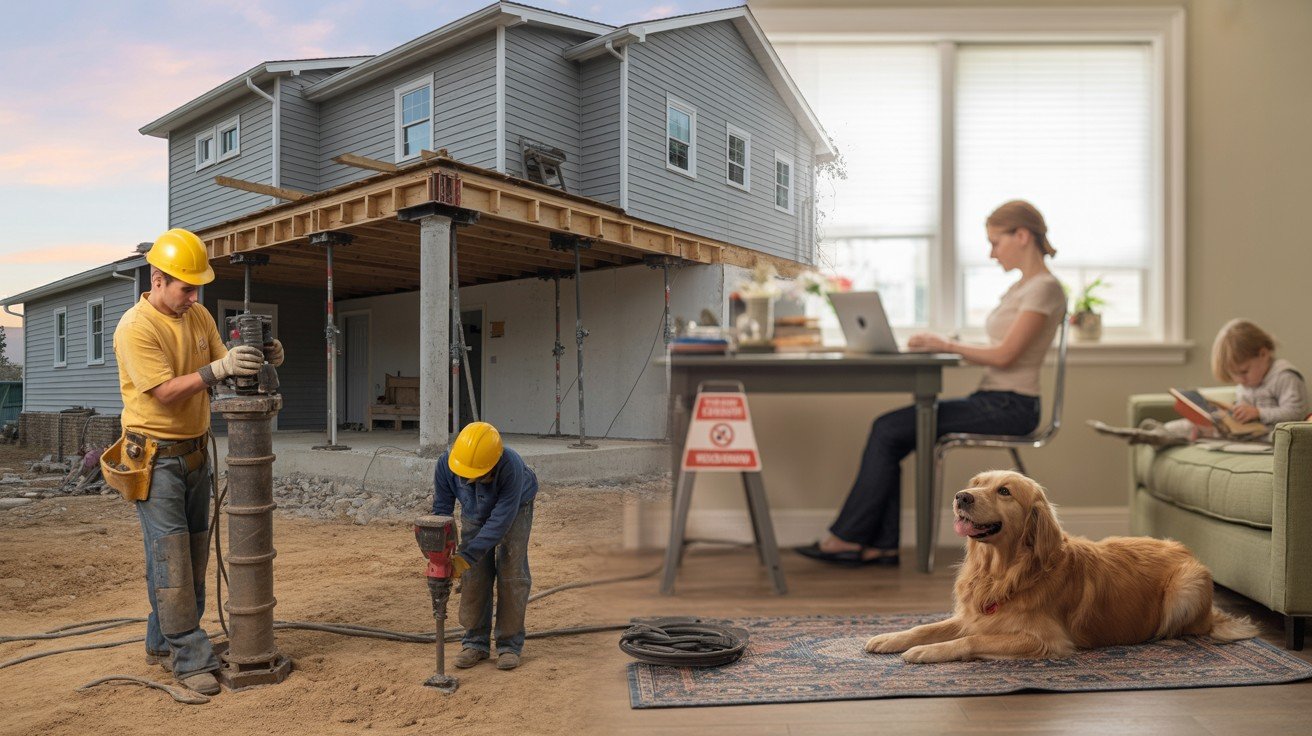Can You Live in a House During Foundation Repair? The Homeowner’s Guide to Staying Put
Foundation issues can strike fear into any homeowner’s heart. When cracks appear or floors start feeling uneven, the big question becomes: do I need to pack up and move out while repairs happen?
The good news is that you can often stay in your home during foundation work.
However, the answer depends on several important factors, including the type of repair needed, where the work is taking place, and your family’s comfort level with construction activity.
Before you start researching temporary housing or imposing on relatives, let’s break down when it’s safe to stay put and when you might want to consider other arrangements.
Understanding your options will help you make the best decision for your situation and budget.
Understanding Foundation Repair
Foundation repair comes in several forms, each with different impacts on your daily life. Slab jacking involves injecting material under concrete slabs to level them; a relatively quick process.
Piering uses steel or concrete piers to stabilize shifting foundations, while wall anchors secure bowing basement walls.
The duration and intensity of these repairs vary significantly. Simple crack filling might take just a day, while extensive piering could require weeks of work.
Most foundation problems stem from common causes: soil settling beneath your home, seasonal ground movement, or water damage from poor drainage.
Understanding which type of repair your home needs is crucial for determining whether you can comfortably remain in residence.
Some methods involve minimal disruption, while others require heavy machinery and extensive excavation that could make staying home challenging.
Can You Stay in Your Home During Foundation Repair?

The short answer is yes, in most cases, you can remain in your home during foundation repairs. However, this decision isn’t one-size-fits-all and depends on several critical factors.
The scope of work plays the biggest role in determining your comfort level. Minor repairs like crack sealing create minimal disruption, while major structural work can turn your home upside down temporarily.
Location matters significantly, too. Exterior repairs often allow normal indoor living, while interior foundation work may require relocating to different rooms or levels of your house.
Noise and vibration levels vary dramatically between repair methods. Some techniques produce constant drilling sounds and ground movement that can be exhausting to live with daily.
Utility access is another consideration. Will you have consistent water, electricity, and gas service throughout the project?
Finally, always listen to your contractor’s professional recommendations about safety and livability during the work period.
Situations Where It’s Usually Safe to Stay
- Minor foundation cracks or exterior pier installation These repairs typically happen outside your home with minimal impact on daily routines. You can maintain normal activities while contractors work around the perimeter of your property.
- Work limited to one side of the home When repairs focus on just one area, you can easily relocate activities to unaffected rooms. This containment allows you to maintain comfort and privacy in most of your living space.
- Little to no disruption of interior flooring If contractors don’t need to remove floors or access crawl spaces through your home, daily life continues smoothly. Your furniture and belongings remain undisturbed throughout the repair process.
- Daytime-only construction schedules Work that happens during regular business hours means peaceful evenings and undisturbed sleep. You can plan activities outside the home during construction hours if the noise becomes bothersome.
- Stable structural conditions with no safety risks When your home remains structurally sound during repairs, there’s no immediate danger to occupants. Contractors can complete work while maintaining safe living conditions for your family.
What to Expect If You Choose to Stay?
Living through foundation repair means accepting some temporary inconveniences.
Expect significant vibration and noise from heavy equipment, drilling, and construction activity that can disrupt normal routines.
You’ll likely lose access to certain rooms or areas while work progresses.
Contractors follow strict schedules and safety protocols, which may limit when and where you can move freely in your home.
Protecting your furniture and personal belongings becomes essential.
Dust, debris, and vibrations can damage items, so plan to cover or relocate valuables before work begins.
Communication with your repair team helps manage expectations and ensures everyone stays safe while sharing the space during construction.
Tips for Living in Your Home During Foundation Repair
- Set realistic expectations with the contractor Discuss timelines, noise levels, and daily disruptions upfront to avoid surprises. Clear communication prevents frustration and helps you plan your schedule around the work.
- Create a quiet or off-limits space away from the work Designate one room as your sanctuary where you can retreat from construction chaos. This becomes your home base for relaxation, work calls, or simply escaping the noise.
- Use noise-cancelling headphones or white noise machines Invest in quality sound-blocking equipment to maintain focus during phone calls or rest periods. These tools help create normalcy when drilling and hammering become overwhelming.
- Keep kids and pets safe and away from the work area Establish clear boundaries and supervision rules to prevent accidents around construction zones. Consider temporary childcare or pet boarding during the most intensive work periods.
- Plan for alternate cooking/bathroom options if needed Prepare backup plans if utilities get temporarily disconnected or access becomes limited. Stock up on ready-to-eat meals and identify alternative facilities if necessary.
Conclusion
Foundation repairs don’t have to force you out of your home in most situations.
By understanding the type of work required and preparing accordingly, many homeowners successfully navigate construction while maintaining their daily routines.
The key lies in honest communication with your contractor about what to expect and realistic planning for temporary inconveniences.
Some repairs will be more disruptive than others, but with proper preparation – from creating quiet spaces to protecting belongings – you can make the process manageable.
Remember that foundation work is an investment in your home’s long-term stability and value.
While the temporary disruption may feel overwhelming, most projects conclude faster than expected when you stay organized and maintain realistic expectations.
Trust your contractor’s safety recommendations and don’t hesitate to ask questions throughout the process.
With the right approach, you’ll emerge with a stronger foundation and the satisfaction of having weathered the construction successfully.
Frequently Asked Questions
How long does a typical foundation repair take to complete?
Most foundation repairs take 1-3 days for minor work, while major structural repairs can require 1-2 weeks, depending on complexity and weather conditions.
Will foundation repair damage my landscaping or driveway?
Some disruption is likely, but professional contractors minimize damage and often include restoration in their contracts. Discuss protection measures beforehand.
Is foundation repair covered by homeowners’ insurance?
Coverage varies by policy and cause. Sudden damage from plumbing leaks may qualify, but gradual settling typically isn’t covered by standard policies.

